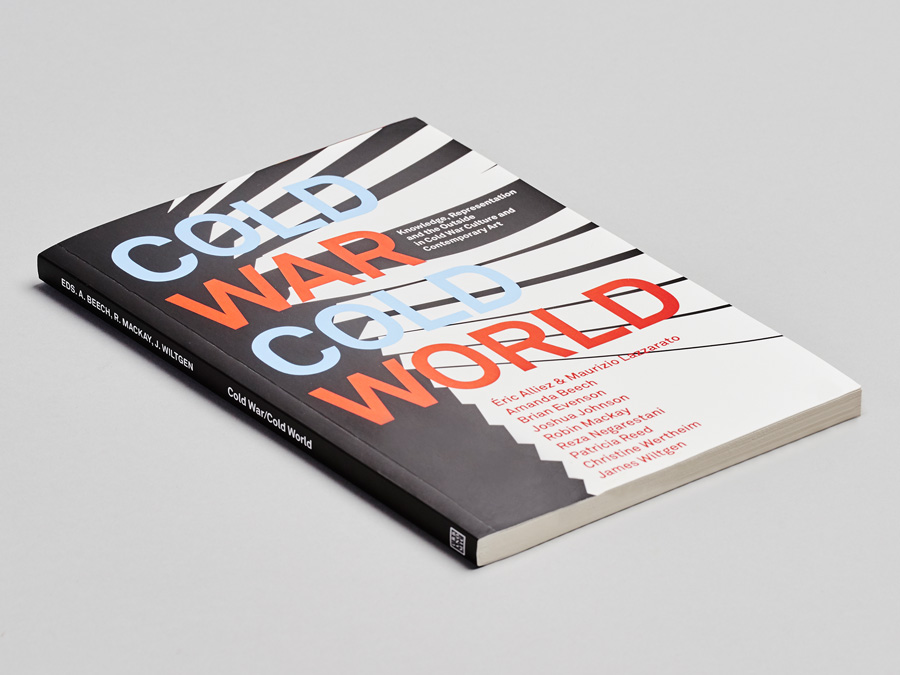 Cold War Cold World (CWCW) is the research group focusing on the term “Cold World,” which many see as descriptive of our current situation.
Cold War Cold World (CWCW) is the research group focusing on the term “Cold World,” which many see as descriptive of our current situation.
In this world of infinite complexity, algorithmic capital, and the technological sublime, we ask, can images and narratives construct agents who might decipher the mutable continuum and cascading contingencies we see today? And, more, how can this Cold World with all its apparent instabilities, this site of “lawlessness” and alienation, be central to the enhancement of human rationality?
While the Cold War embedded, expressed and performed the dread of an epoch heralded by the confrontation with perplexing yet rampant forces of nihilism and extinction, today these have morphed and congealed into new forms of terror and fear, producing a ‘Cold World’ driven by a nascent full spectrum dominance under the aegis of ‘Algorithmic Capitalism.’ Potentially adrift in the massive explosion of digital images and algorithmic data-forms generated across multiple platforms, we encounter a strange type of machinic joussiance in a variant of Marxian hyper-commodification, produced by the iterative looping of a control society bent on modulations of tracking, prediction, and the diffusion of dividuals.
The CWCW Research Group argues instead for an alternative view in which Cold War aesthetics is loosened from its anthropomorphic moorings, providing navigational protocols for assessing these machinic formations as generators of new languages and other forms of communication that do not require a correlate between the unknown and human disappearance. The project both critiques what we identify as the Cold World paradigm—in terms of temporal formation, art, and political economy—and interrogates the moving image and narrative configurations as primary modalities of expression and experiment in epistemological, ontological and teleological formations in the contemporary moment.
Cold War Cold World established in 2015 involves workshops, seminars and public discussion that combine philosophical, critical and artistic inquiry.
Objectives
- Critique what we identify as the Cold World paradigm, where the contemporary—as temporal formation, as art and as political economy—will be subjected to dense articulations of critique.
- Generate new rules by and for “a-subjective agency.” The abstract and the concrete form a key architecture of analysis, with the stricture that there exists no antecedent reality that serves as the basis of critique.
- Develop a theoretical model that comprehends consciousness, change and reason and the place of the understanding in a re-orientation of thought at the level of public consumption and mass experience.
- Interrogate the moving image as a primary modality of expressions and experiments in epistemological, ontological and teleological formations today and for the future.
Directors
Amanda Beech
James Wiltgen
Members and affiliates
Christine Wertheim
Matias Viegener
Brian Evenson
Eyvind Kang
Adam Berg
Reza Negarastani
Patricia Reed
Joshua Johnson
Keith Tilford
Information
Cold War cinema embedded, expressed and performed the dread of an epoch, the confrontation with perplexing yet rampant forces of nihilism and extinction. Inside these frames, images, narratives and objects mirror the faces of incomprehensible and ubiquitous enemy forces placing the role of culture as an idealized space of kitsch titillation, folkloric explanation/explication, spectacle and collective psychosis. Marking in multiple ways the naming/advent of the Anthropocene Era, those forces have morphed and congealed into new forms of terror and fear, producing a ‘Cold World’ driven by a nascent full spectrum dominance under the aegis of ‘Algorithmic Capitalism.’ Potentially adrift in the massive explosion of digital images generated across multiple platforms, algorithmic data-forms, made by and for machines and beyond human vision we encounter a strange type of machinic joussiance in a variant of Marxian hyper-commodification, produced by the iterative looping of a control society bent on modulations of tracking, prediction and the diffusion of dividuals.
Whilst this abstraction of Cold World visuality could be seen to instigate a new form of the technological sublime, and reawaken narratives of the crisis of human life and its intelligence, it also urges thought to loosen itself from the anthropomorphic moorings of Cold War aesthetics, so as to encounter the machines that humans have produced as generators of other languages and other communications that do not require the correlate between the unknown and human demise. Parallel to these shifts, ‘alien’ experiences, narratives of ‘other’ forms, and topographies and excursions into unknown possibilities often seek to trouble, reject and surpass the condition of the human as we know it ahuman decenterings calling forth modes of ‘rational inhumanism.’
This project makes the claim that the clash between the manifest and the scientific image, and between art, science and philosophy must be taken up in order to navigate and remap the conditions of the image/sign coordinates, and in particular the image as a diagram of power dynamics. Fundamentally, we ask if a new mode of naming is tenable for this required cognition of visuality, conception and experience, taking critical account of the legacy, necessity and traction of aesthetics, semantics and normativity.
Events
- Feb. 5, 2016 – Reza Negarastani: Rationality, Computation, and the Clash of Images
- April 15, 2016 – Benjamin Bratton. Workshop: Reading The Stack
- Nov. 14, 2016 – Panel discussion Neoliberalism, Neo-Con, Neo-Noir: The Cold World and Fiction. James Wiltgen, Chair, Speakers, Amanda Beech, Robin Mackay, Reza Negarastani.